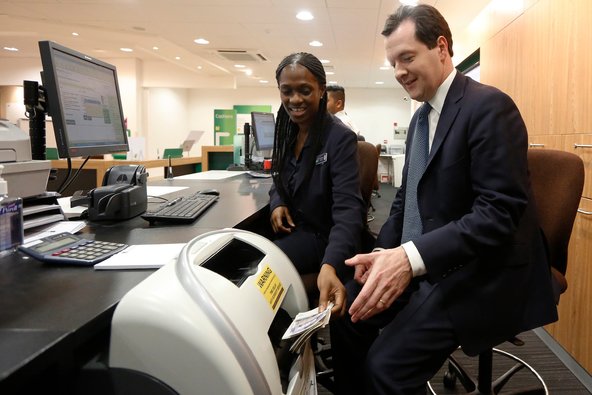 Luke MacGregor/ReutersThe chancellor of the Exchequer, George Osborne, at a Lloyds branch in London on Wednesday.
Luke MacGregor/ReutersThe chancellor of the Exchequer, George Osborne, at a Lloyds branch in London on Wednesday.
LONDON — The British government is preparing to sell part of its holding in the Lloyds Banking Group and is weighing a breakup of the Royal Bank of Scotland, the chancellor of the Exchequer said on Wednesday.
The comments were the clearest sign yet of the government’s approach to the two banks, which were rescued during the financial crisis. Nearly five years later — and with a general election on the horizon — questions have been raised about when the government might be able to whittle down the taxpayers’ 39 percent stake in Lloyds and 82 percent stake in the Royal Bank of Scotland.
At the annual Mansion House dinner here attended by senior financial executives, the chancellor, George Osborne, said that the government was “actively considering options for share sales in Lloyds.”
While giving no timetable, he said that a sale of the first block of shares was likely to go to institutional investors, noting that Lloyds was in a “good position,” with investor appetite increasing.
But he said that any decision on the Royal Bank of Scotland — whose chief executive, Stephen Hester, surprised investors by announcing his departure last week — was still “some way off.”
One possibility was to split the bank’s troubled assets into a “bad bank.” In hindsight, Mr. Osborne said, “splitting R.B.S. into a good bank and a bad bank was probably what should have happened in 2008.”
Now, he said, “we will urgently investigate the case for taking the bad assets — those mistakes of the past — out of R.B.S.”
The Treasury, Mr. Osborne said, would look in particular at putting the bank’s British commercial real estate holdings and its Ulster Bank subsidiary into the “bad bank.”
But he added that “we’re not prepared to put more taxpayer capital into R.B.S. as part of this process.” He said that a decision on the bank would be made in the fall.
Some lawmakers and analysts had urged Mr. Osborne to use the Mansion House speech to dispel some of the uncertainty surrounding the two banks and present a clear timetable for when the government would start selling the stakes. Pressure on the government to do so is building ahead of the next general election, expected in 2015.
But for Mr. Osborne, the stake sales are just part of a longer list of banking issues he has to resolve before that election. He is expected to back proposals in a report by a parliamentary banking committee that was released earlier in the day to introduce criminal penalties against banking executives.
The 600-page report, which was commissioned by the Treasury, may have made for uncomfortable reading for many in the room on Wednesday evening, because one of the recommendations was to threaten banking executives with prison should they behave recklessly in their jobs.
Prime Minister David Cameron told Parliament on Wednesday that he was in favor of “penalizing, including criminal penalties against bankers who behave irresponsibly.”
Mervyn A. King, who is retiring as governor of the Bank of England at the end of this month, also spoke at Wednesday’s dinner. One of the jobs he is to pass on to his successor, Mark J. Carney, the former governor of the Canadian central bank, is to improve the stability of British banks.
“All our major banks remain highly leveraged,” Mr. King said. “And of course the two biggest lenders to the domestic economy remain largely in state ownership. It is difficult to imagine a banking sector like that making a real contribution to any economic recovery.”
Mr. King reiterated that there were clear signs of a modest economic recovery but that “growth is not yet strong enough.” Support for the recovery was still needed, he said, adding that “it will inevitably be a bumpy ride.”
Article source: http://dealbook.nytimes.com/2013/06/19/britain-to-start-sale-of-lloyds-stake-soon/?partner=rss&emc=rss
Speak Your Mind
You must be logged in to post a comment.